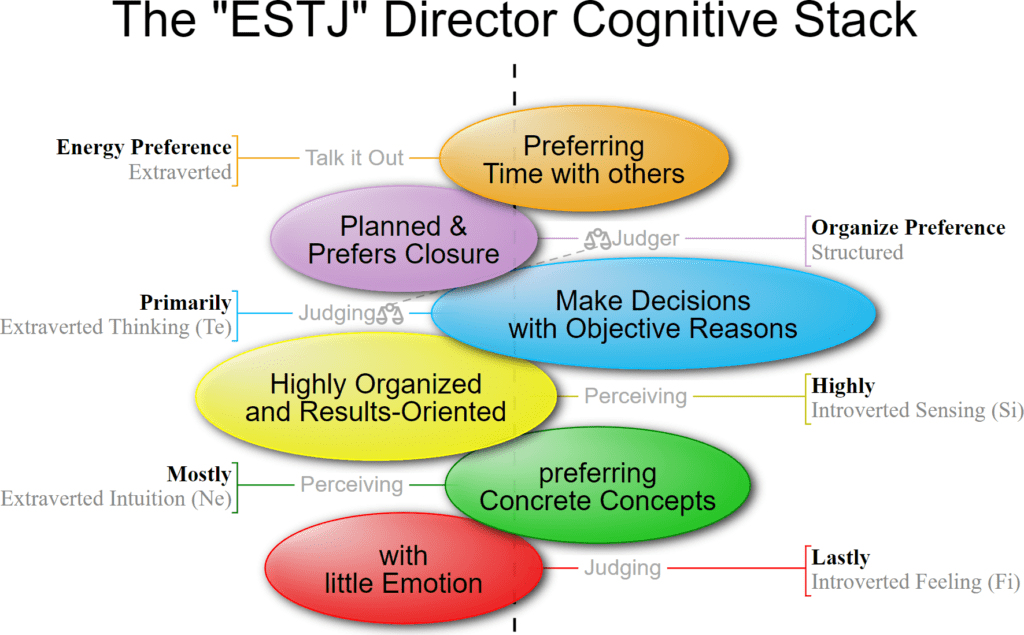What is the MBTI ESTJ “Director” Personality Type?

People with ESTJ Personality Type are often described as practical and willing to take charge.
They are committed to traditions, standards, procedures, and laws and expect others to uphold these same principles.
Directors will ensure that things run smoothly and according to plan and the rules.
With extraverted thinking as their top extraverted function, directors are Judges who use objective Reasoning when making decisions, with little emotion from their introverted feelings as their lowest function.
Directors like to organize the facts and are results-oriented with their Introverted Sensing.

With their Extraverted Intuition, they are focused more on the here and now, preferring concrete concepts over abstract ideas.
Directors are extraverted, preferring time with others to discuss things. They are also structured, like to plan and prefer closure.
Directors are “Concrete Judgers” with Introverted Sensing and Extraverted Thinking. They will disapprove of you in detail when threatened. And may behave in the Blammer Satir communication style.
ESTJ Personality Type cross-reference
- Keirsey Type – Supervisor
- Temperament Type – Melancholy
- Animal Type – Beaver
- DISC Type – Compliant
- Socio-Communicative Type – Analytical
- True Colors – Gold
- Color Code – White
- Personality Compass – East
- Occupational Type – Realistic
- Learning Type – Pragmatist
- Leadership Type – Avoider
Enneagram Types
The Enneagram is a Personality Typing System comprising nine different types.

Dominant Function – Extraverted Thinking
- ESTJs rely on objective information and logic rather than personal feelings to make decisions.
- People with ESTJ personality types tend to be very practical.
- They enjoy learning about things they can see an immediate, real-world use for but tend to lose interest in abstract or theoretical things.
- ESTJs prefer concrete facts as opposed to abstract information.
Auxiliary Function – Introverted Sensing
- They are good at remembering things with great detail.
- Because their sensing function is focused inwardly, they tend to be less concerned with novelty and more focused on familiarity.
- They enjoy having habits and routines they can depend upon.
- While this gives them stability and predictability, it can make them stubborn and unyielding.
Tertiary Function – Extraverted Intuition
- This aspect of personality seeks out novel ideas and possibilities.
- They often use their recollections of past experiences to connect with current events.
- This allows them to look at incoming information and recognize that there may be more than one interpretation or possible outcome.
Inferior Function – Introverted Feeling
- While this function is not used as often, in some cases, a person might allow their subjective feelings to override their objective interpretation of a situation.
- ESTJs tend not to think much about their emotions, so this function often operates unconsciously.
ESTJ Traits
People often describe ESFJs as predictable, stable, committed, and practical.
They tend to be frank when sharing their opinions, which can sometimes be seen as harsh or overly critical.
ESTJs tend to value tradition, rules, and security. They use logic and traditional principles to guide them through life.
Because of their orthodox approach to life, they can sometimes be seen as rigid, stubborn, and unyielding.
Maintaining the status quo is essential to ESTJs, and they often become involved in civics, government, and community organizations.
They learn best in situations where objectives (as well as details) are established so they can plan. Thus, they are good with deadlines.
ESTJs’ take-charge attitude makes it easy for them to assume leadership positions. They are quick to devise a plan and execute it.
They can sometimes appear critical and overly aggressive, particularly when others fail to meet their high standards.
Strengths
- Practical and realistic
- Dependable
- Self-confident
- Hard-working
- Traditional
- Strong leadership skills
Weaknesses
- Insensitive
- Inflexible
- Not good at expressing feelings
- Argumentative
- Bossy
ESTJ Relationships
Friendships
- People with this personality type are very social and enjoy getting their friends involved in activities they enjoy.
- ESTJs often prize dependability over almost everything.
- If you are a stable friend who sticks to your commitments, you can likely forge strong friendships with an ESTJ.
Personal Relationships
- As extraverts, ESTJs are very outgoing and enjoy spending time with others.
- They can be very boisterous and funny in social situations and often enjoy being at the center of attention.
- Family is also vital to ESTJs.
- They put a great deal of effort into fulfilling their family obligations.
- Social events are also important; they are good at remembering essential occasions such as birthdays and anniversaries.
- They look forward to attending weddings, family reunions, holiday parties, class reunions, and other occasions.
- One potential weakness for ESTJs is their tendency to be rigid in rules and routines.
- They take their own opinion quite seriously but are far less inclined to listen to what others say.
Partner Relationships
- ESTJs are dependable and take their commitments seriously.
- Once they have dedicated themselves to a relationship, they will stay true to it for life.
- They tend to neglect feelings, which can sometimes be difficult for their partners.
- While they may not express their feelings through words, remember that they often convey their emotions through actions.
Parenting
- ESTJ children tend to be very responsible and goal-directed. But be cautious to avoid placing too many expectations on your child’s shoulders.
- They enjoy structure and routine.
- While they are skilled at self-direction, they still need guidance and rules to give them the security they crave.
ESTJ Careers
- Because they appreciate order and organization, they frequently do well in supervisory and management positions.
- In such positions, they are committed to ensuring that group members follow the rules, traditions, and laws established by higher authorities.
- They strive to follow directions to the letter and show respect and deference to authority figures.
- Their high respect for laws, authority, and order helps them excel in law enforcement roles.
- ESTJs are very hard-working and dependable in school and work situations.
- They are thorough and punctual about completing their work and rarely question or complain.
- ESTJs have various personality characteristics that help them excel in multiple careers.


